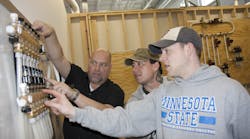Latest from Best Practices
Sponsored
Mentoring changed my life. Period. Early in my life I was directionless, purposeless, scattered and searching. But one strategic mentor changed my entire adult life. His passion for hydronic heating drew me in like a bug to a light. And I was zapped! Heating and air conditioning became my career as well as my passion. (For reference, check out the first article of this two-part series online at http://bit.ly/1ATblkY.)
After that experience, I wanted to be a mentor too. So, back in the 1980s, using the leftover parts from dozens of jobs in various degrees of working order (you know what I’m talking about … I bet you have a garage full of the same stuff!), I emptied my garage and transformed it into a makeshift HVAC training room. Crude, but enough to get things going, I thought.
One area of the garage turned into a refrigeration area with a marginally working refrigerator with a host of problems. Another area had a (sort-of) working condenser and an A-coil for air conditioning. Another had a 35-year-old beer cooler with a wildly erratic TEV valve. A workbench for hands-on electrical circuitry filled yet another area, and a furnace of dubious safety rounded out the training space. (I never actually connected the gas — not enough faith in it.) Finally, I topped it all off with an old chalkboard. Now I had a classroom, but no one to mentor.
A new direction
I needed students, so I decided to go to a halfway house for people who had run-ins with the law. I approached the director of the home and told him what I wanted to do and asked him if he had any people who might need a new direction in life, but weren’t serial killers. (I was married by now and felt I needed to provide some level of safety for my wife.)
After some continued conversation, he said he might have a name or two, and after a few days of drafting up some guidelines and boundaries, four people showed up at my garage to begin training. For four months, two nights per week and all day Saturday they came to my “classroom.” Two of the four students got jobs at Toro Manufacturing, building their reefer trucks, before the class even finished. Toro Manufacturing then paid for their vocational school training as they continued to work there.
One of the two, whose name was Dave, just passed away two years ago after a great life. He kept it together, got married and had a nice family. I continued putting on the class for two more years with groups of two to five people before I just couldn’t keep up with it all. But to this day, it remains one of the most satisfying experiences of my life. I got way more out of it than any of the students, I am convinced. And my wife and I met some really great people who simply needed a leg up. It was a win-win for everyone.
Now, I’m not advocating that you do what I did. Looking back on it, it could have all blown up in my face. But the point is, many great mentoring opportunities come from thinking outside the box — either in recruiting or implementation. And, sometimes, way outside of the box!
Finding new talent
Look outside the industry for new talent! Most of us looking for talent already know to go to the vocational schools, and I would highly recommend them as a starting place. Most vo-techs allow — and even encourage — you to hire some of these great students for part-time work, which is a great win for both parties. They get to see what it’s really like outside the classroom, and you get a chance to see them in action.
But if the local vo-techs aren’t giving you what you are looking for, try a new angle.
I have a friend whose name is John Parizek. We started in the industry at the same time and have been friends for more than three decades. Today, John is the lead instructor for apprenticeship training, chairman of the state plumbing board and the Region 2 director for the American Society of Sanitary Engineering.
My point in telling you about John is that both he and I began in the apartment industry, doing maintenance. If you are looking for talented, motivated people to draw into the trades, one really good source is the multi-housing field. Most states have a multi-housing association, and many of those do maintenance training. You will be amazed at the talent pool that is waiting for you there. Check it out. There is no sense fishing if the lake has no fish. Find a new lake.
Here is one more thing you might consider. Check out vocational schools located in farming communities. Finding young people doesn’t seem to be that big of a problem. Finding hard-working young people is another issue all together. For some reason, farming communities seem to produce a work ethic that is very beneficial to the trades.
Of course, metropolitan or urban community colleges also have hard-working students. But if you’re having difficulty getting enough new, hard-working talent, don’t be afraid to contact these outstate vo-techs. They are a great source for additional talent.
And if you’re up for a fun challenge, offer to come into one of the local vo-techs to teach for a half day or even a full day about some particular part of the industry that you are passionate about or really good at. It will give you and your company some great exposure to potential, future employees.
Show the cool stuff!
In the first Harry Potter movie, when Harry wanted to find out which direction in life to move toward, he put a special hat on his head and the hat told him where he needed to go (and the hat never made any mistakes). I have been unable to locate this hat. If I found the hat, I would like to see if I could persuade the hat to tell young people to join the trades.
Since I don’t have the hat, I have had to find other ways to influence young people. One of the more unique approaches I have tried is visiting local middle schools during their career days and demonstrating a couple of hands-on projects, such as soldering and electrical troubleshooting. They find it fascinating!
We as an industry have an image problem. If you ask a young person what a plumber does, his first impression is a man stuck up under a kitchen sink cabinet with a leaking P-trap dripping in his face and a plunger in his hand. Who wants to go into a career like that?
But if you show students a 50-ft. cable with a video camera on the end or a thermal imaging scanner that connects to a computer, all of a sudden they listen with a new set of ears. Young people love technology, and our industry has some really cool technology to play with.
I’ll refer you back to the RIDGID survey done in 2009 that I referenced in Part 1 of this series. The survey found 77% of high school students would consider a career in the skilled trades once they had exposure to what goes on in them. We have cool stuff…let’s find a way to show it off. Toilet plunger: not cool. Ramset gun: way cool!
Join a national initiative
What do you call a fat guy on a teeter-totter? A catapult. Our trades are being catapulted out of the career game by the “fat guy” of the education system and its “four-year university training” mantra.
I am just a few years away from being a Walmart greeter. I am already saving up the snazzy buttons to wear on my shirt. With whatever time is left, I continue to remember a quote by John Maxwell: “There is no success without a successor.”
It will be difficult for me to finish my career with success if there is no one there to succeed me. And I am not alone in this. I have heard from several contractors who have had to shut their doors after 30 years of business because there is no one to pass the baton to. What a loss! (As a side note, one of the greatest benefits of mentoring is that often you can find just the right person to hand off your business.)
Having said that, there are initiatives underway around the country that are seeking to take the fat guy off the teeter-totter. If you want to see one of these initiatives, search on Google for “nuts and bolts and thingamajigs.” Also, check out the Office of Career, Technical and Adult Education (OCTAE).
Association for Career and Technical Education (ACTE) is the largest national association dedicated to the advancement of education that prepares youth and adults for careers. It has been around for years and helps promote technical training. If these initiatives are successful, they will help ensure our ultimate goal of providing successors for the industry.
I hope you have found some of these tactics a useful starting point for the future. There are many people out there with other great ideas on how to attract a future generation and how to be a great mentor. If you have some thoughts on ways we can improve the future of the trade industry and its workforce, I would love to hear you.
Steve Swanson is the customer trainer at Uponor Academy in Apple Valley, Minn. He can be reached at [email protected].


